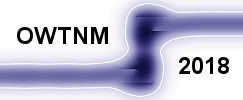Topics
Topics of interest for the OWTNM workshop address the physical understanding, the mathematical description, and the computational treatment of guided as well as non-guided optical waves and related effects in micro- and nanostructures. They include, but are not limited to:
-
Passive and active waveguide devices:
Simulation and design of photonic integrated systems, linear and nonlinear effects in waveguides and waveguide arrays, light localisation in space and time, grating structures, in- and out-coupling device schemes.
-
Optical micro-resonators:
Passive and active optical cavities, resonator circuits, excitation and spectral engineering, photonic atoms & molecules, and respective applications.
-
Photonic crystals:
Photonic bandgap structures, photonic crystal devices, photonic crystal fibres, and respective applications.
-
Photonic nanostructures and metamaterials:
Nano-resonators and -antennas, resonator arrays, homogenization, optical metamaterials, surface-enhanced Raman scattering, photon management by nanostructures in PV and OLED structures, metamaterial waveguides.
-
Plasmonics:
Metallic waveguides and nanowires, tapers and field enhancement, array-effects in metallic nanostructures.
-
Optoelectronic devices:
Waveguide lasers, fibre amplifiers and lasers, micro-lasers, mid IR and THz sources.
-
Guided wave sensors:
Fibre optic and guided wave / integrated-optic sensing devices, systems, theories and techniques, bio-sensors.
-
Multiphysics effects:
Coupling of optical, electronic, acoustic, mechanical, and thermal simulations.
-
Optimization, Packaging and Integration:
Simulation tools for design and optimization, fabrication process theory and simulation, packaging and integration issues.
-
Advances in analytical, numerical, and computational methods:
Generic & configuration-specific; efficient approximate tools & large-scale simulations, parallel computing.
